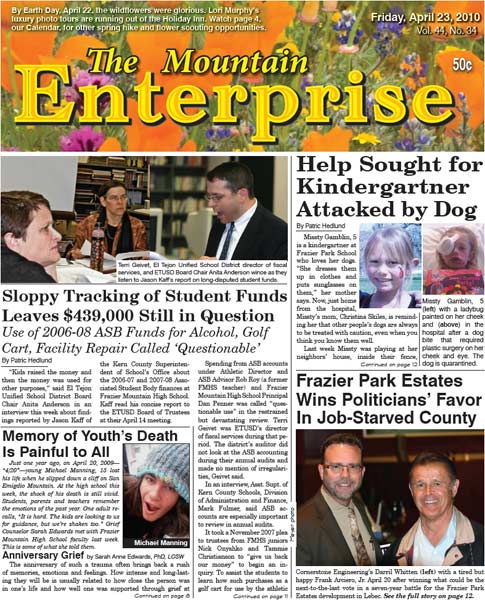Just one year ago, on April 20, 2009— “4/20”—young Michael Manning, 15 lost his life when he slipped down a cliff on San Emigdio Mountain. At the high school this week, the shock of his death is still vivid. Students, parents and teachers remember the emotions of the past year. One adult recalls, “It is hard. The kids are looking to us for guidance, but we’re shaken too.” Grief Counselor Sarah Edwards met with Frazier Mountain High School faculty last week. This is some of what she told them. —Editor
Anniversary Grief
By Sarah Anne Edwards, PhD, LCSW
The anniversary of such a trauma often brings back a rush of memories, emotions and feelings. How intense and long-lasting they will be is usually related to how close the person was in one’s life and how well one was supported through grief at The kind of feelings, thoughts, and behavior one might expect to have or to see include:
- Confusion and embarrassment about the return of feelings thought resolved or buried
- Any of the emotions common to grief itself: sadness, tears, anger at the person or the circumstances, worry, fear that such things could happen again, anxiety, irritability, guilt about what one did or didn’t do
- Physical symptoms like headache, stomach ache, muscular tension, nostalgia
- Dreams related to the loss
- Poor concentration
It’s important to realize that a mild, brief period of such feelings is normal for all of those who were deeply affected by the loss.
Often an anniversary can be a time of healing, closure and growth, especially when one has a safe, non-judgmental, caring and supportive social environment to discuss feelings, share memories, and incorporate contributions the one we’ve lost has made to our lives.
If someone did not have the opportunity for support and healing at the time of the original loss, the anniversary may trigger more serious concerns known as Post Traumatic Stress. If this occurs, the person should seek professional assistance to prevent it from becoming a serious recurring issue. Noticing signs of such unhealed pain at this time is important.
Be alert to:
- Very intense or continuing grief emotions as mentioned above that continue for a week or more
- Crying jags
- Acting out, reckless or risktaking behavior
- Hyper-sensitivity
- Any signs associated with depression or suicide such as withdrawing from friends and activities, flattened affect, writing or talking about death.
Such signs should never be ignored. They are a cry for help.
Absent such concerns, though, the most important thing to keep in mind at a time like this is that grief takes time to heal. It calls upon us to be understanding, patient, nonjudgmental and reassuring with ourselves, our friends and loved ones.
This is part of the April 23, 2010 online edition of The Mountain Enterprise.
Have an opinion on this matter? We'd like to hear from you.



